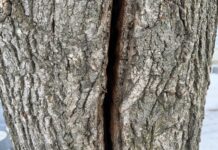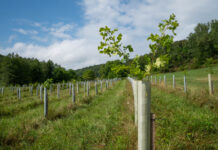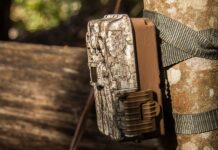STERLING, Ohio – Lying in a hospital bed in the days following his accident, Scott Stoller knew he would stay in farming.
“It was never an option,” he said. “I never considered doing anything else.”
After a safe and bountiful harvest season, Stoller was cleaning his New Holland round baler.
“I was standing on the wheel on the left side of the baler and I reached for a corn stalk to toss it out of the baler. The belts grabbed my hand and pulled it partway into the rolls,” Stoller recalls.
The force grabbed his hand up to his wrist and the moving belts continued to grab anything they could get a hold of and the belt pushed him toward the rolls in the baler.
The strings on his clothes tightened to the point of almost choking him.
It was only by the grace of God, Stoller says, that he was able to loosen the strings, then the pull of the baler ripped his zippers open.
“Enough of my clothing had wedged between the rolls to stop the belts that I was lying on,” he said. “The drive roll continued to screech and smoke. When the belts burned in pieces, it dropped me on my feet while my right arm was still in the baler.”
Fighting for his life
Stoller’s thoughts were jumbled; he was facing death, yet his mind was on his wife, Charlene and his children. He fought to stay alive.
The rollers had created enough friction that his coat started smoking.
“My right arm was extremely hot, but I was extremely cold everywhere else.”
Stoller knew he was in trouble, so he took a marker from his coverall pocket and left a note for his wife to let her know that he loved her and prayed for his children.
Even as he prepared himself for the worst, Stoller knew that he had to fight to stay alive and make an effort to get himself out of the baler, but the wind and brutal cold compounded his efforts.
Stoller took a marker from his coverall pocket and left a note for his wife to let her know that he loved her and prayed for his children.
Although his wife was at a neighbors, Stoller hoped that someone – perhaps his employee or the milkman – would find him and call for help. He continued to call for help, look at his watch and pray.
His wife, Charlene, and two of his three children arrived home and found Scott. He told her to turn off the tractor and call 911 and his parents. He also asked her to call Sterling Farm Equipment for assistance, as the EMTs would possibly need assistance to release Scott from the baler.
By the time he was loaded onto the stretcher and prepared for transport, he had been trapped in the baler and out in the cold for almost three hours.
He was first taken to Wadsworth-Rittman Hospital where he was stabilized and then transferred to St. Thomas Hospital where he met up with Dr. Nicholas Papas. He spent about seven days there, followed by nine days at Akron General Hospital.
Stoller said that many of the procedures that were used in his case were experimental, but it was worth it, as the goal was to save as much of the arm as possible to enable him to successfully use a prosthesis.
They did skin grafts, bone grafts, and muscle grafts, Stoller said.
“I was in absolute misery, but it was worth it to save my elbow. I asked a lot of questions prior to my surgery. If I drank a lot of pop or coffee, the surgeons would not have done these particular procedures,” he added.
Still thinking of others
Stoller wasn’t used to lying in bed, so he used his time between surgeries to travel up and down the hall and visit with his fellow patients.
“I realized that I wouldn’t want to trade places with anyone in the world,” he said. “People look at this (accident) as a major hurt, but there are other people hurting as well.
“I think it is easier to be the one who was hurt, because accidents such as this are hard on the people around you.”
In addition to the surgeries, Stoller faced the challenge of a serious infection during his stay in the hospital.
“I could have burned, froze or bled to death if I had passed out while I was trapped in the baler,” he said. “I could have strangled, but for some reason I got through it. But when I was in the hospital, I got a resistant infection. The staff told me that prayer cured me because there wasn’t anything that they could do. No one could touch me, the staff had to handle everything I used separately. I felt like a leper.”
Helping hands
Stoller said one reason he was able to continue to farm is because he married the right girl. “I have to give Charlene a lot of credit for making the farm successful,” Scott said.
The couple’s parents, Everett and Marge Stoller and Joe and Lilas Rufener, have also helped.
“You definitely need to check out in-laws very carefully before you get married,” he smiles.
Stoller added that not only has the family been supportive, but friends and members of their church have been there as well.
That first night, eight people were there to do the chores.
“In fact, the first year after my accident, someone was at the farm every day to help do the chores,” Stoller added. “I couldn’t milk the first year, but the fieldwork went well. I had all kinds of time to be on a tractor.”
Perspective
Stoller said after the accident, he lost some things, but he also gained some things.
“In this country, people, in general are willing to help you if you have a disability, they will smile and hold the door for you,” he said. “I went on a trip to Japan to market food grade soybeans and they don’t treat handicapped people very well.”
Stoller added that while he would obviously like to have his hand back, he has received benefits that he wouldn’t have received otherwise.
“I am not special, I didn’t make heroic choices, but I just didn’t like the alternatives,” he said. “When I was caught in the baler, my choice was to struggle, or die, when I was in the hospital, my choice was to be disabled or learn to deal with the situation. Faith, family and friends got me through this.”
Adapting
After Scott’s accident, the family worked with the Bureau of Worker’s Compensation to make changes around the farm. “They worked with us and listened to us.”
Installing a remote control on the silo unloader, for example, made using the silo easier for Scott. They also installed a feed bin by the barn and a water hydrant by the calf hutches so they didn’t have to carry water from the barn to the hutches.
The farm where the Stollers live and work had belonged to Scott’s grandparents and he had been working as a hired hand prior to his accident. “We bought the first half of the farm shortly after the accident and we bought the rest of the farm a year later.”
Today, Scott and Charlene, along with their children, Doyle, 13, Lynelle, 11, Nelson, 9, Warren, 5, Tobias, 3, and Clark, 1, own 249 acres and rent an additional 86 acres to raise corn, bean, wheat, oats, barley, alfalfa and clover/grass mix hay to provide feed for their 80 milk cows and 70 replacement animals.
They also raise popcorn for their own use and have some chickens for their own use.
They have also switched to intensive grazing, which works well since they also made the transition to producing milk and crops organically in 2001.
Their conservation efforts paid off as they were named the Wayne Soil and Water Conservation District’s Conservation Farm of the Year, the Ohio Farm Family of the Year in 2001 and received the Ohio Livestock Coalition’s Environmental Stewardship Award in 2004.
“I think farmers need to find a niche market or expand, but I want to keep this farm a family farm,” Stoller said.
“I hope that I am able to pass this farm on to our children if they want to farm,” he added. “We want to let the children test their wings, and we hope that we have taught them well enough that they will be OK.”
* * *
What I learned from my accident:
1. Quality time is a poor substitute for quantity time. Children are going to grow up with or without us; you need to spend time with your children.
2. Obey God, regardless of the cost. Live each day as if it was your last. No matter where you are, there you are. If you are going to be unhappy here, you are going to be unhappy there.
3. Don’t ever say, “If I could only stay in bed until I am tired of it.”
4. If you get off of a tractor, turn it off. Turn off your equipment. I tried to save 10 minutes and I lost a year of my life.
5. We can each make a small difference, do what you can do; you are not going to change the world, but you can help.
6. For men, there really is some value to Lamaze class. I used focal point and pain management techniques while I was still in the baler.
7. It takes a man to cry. There are times when it is OK to cry – just go ahead and do it.
8. My accident made me more proactive as far as safety is concerned.
9. I think it is important that there is no anger among the family; you need to ask yourself if everything is OK with the family.
10. Sometimes you get a “poor me” attitude, but you have to get over it.
– Scott Stoller









